In a world dominated by mass-produced goods, handmade items still hold a special place for many. From homemade treats like cakes and pastries to clothing and everyday utensils, handcrafted items are considered symbols of authenticity and purity.
As of 2025, handmade items have a global market of over $900 billion, and there’s no doubt that a majority are traded through ecommerce platforms. This blog is all about those platforms, covering their definition, key features, and the top options available.
So continue your read to explore the best ecommerce platforms for handmade items.
What is Ecommerce Platform for Handmade Items?

Like every other product having multiple platforms to be used, sold, or purchased on the internet, handmade items also come with thousands of platforms to be traded off.
Like every other product that are used, sold, and purchased on the internet, there are several platforms that can help you effectively promote and sell handmade items.
Typically, these platforms are categorized into two major types. You can either create, own, and manage an online store by yourself, or you can create a profile on multi-vendor platforms and list your products there for an existing audience.
We will explore both of these criteria, and you can choose the option suited to your needs.
What to Look for in an Ecommerce Platform for Handmade Items
Before jumping onto the list, let’s go over the checklist for choosing the right ecommerce platform for handmade items. Not all platforms are created equal, so it’s important to focus on factors that meet both your needs and your buyers’ expectations.
- User Experience
The first thing to consider in any ecommerce platform is user experience. Your chosen platform should be fast, easy to use, and simple for new users to manage. A better user experience not only benefits your customers but also makes daily store management much easier for you.
Keep in mind that as the product catalog grows, many ecommerce stores tend to slow down, which can negatively affect sales. This is why ensuring a fast and smooth user experience is highly recommended.
- Interface
The appearance of the platform also guides it to success or failure. A platform with a poor interface, element placement, etc. can improve both your navigational experience but also the user’s comfort in using your store.
Remember that initial impressions about the store can set your business apart from others.
- Product Management
A good ecommerce platform should let you manage your products hassle-free. Look for features like categories, pricing, inventory tracking, etc. minimize your work effort and help keep your store organized.
- Responsiveness
Your platform must work well on all devices, especially mobile as the majority of the audience are mobile users. A responsive designs ensure that customers can enjoy a similarly smooth shopping experience irrespective of the device type they are using.
#Quick Statistics
It is estimated that mobile commerce will responsible for approx 59% of all ecommerce sales.
- Customer Management
Managing customer information i.e. name, contact-shipping information, etc. should be simple. A platform that helps you manage customer lists efficiently will contribute to better loyalty and sales.
- Order Management
Managing orders is the core of your business operation. An efficient order management system keeps track of orders, updates statuses, and ensures smooth processing. This is essential for hassle-free daily operations.
- Delivery and Fulfillment
Your platform should support multiple delivery options and seamlessly integrate with shipping providers. You should also be able to update delivery statuses of running orders, as every order progresses. A faster, reliable fulfillment process improves customer satisfaction and builds trust.
- Advanced Reporting
Ecommerce businesses are all about handling long sheets consisting of digits and numbers. Having a clear picture of business goings-on can help you understand how your sales, customer behavior, and inventory are being managed.
Look for platforms that offer detailed, clear, and helpful analytics that are updated in real time.
- Integration
Product listing is just half the task of running an online handmade item store. To run a successful online store, you’ll also need payment gateways for easy transactions, marketing integrations to automate promotions, and third-party apps to streamline operations, because a great shop does more than just showcase products.
Choose a platform that offers such integration opportunity if not provided by default.
- Security
Security should be one of your top-most priorities when selecting an ecommerce platform for handmade items. A secure platform protects both customer data and transactions.
Most importantly, it builds trust with your buyers, which encourages them to return to your store again and again.
6 Best Ecommerce Platforms for Handmade Items
With a basic understanding of the checklist for selling handmade items on an ecommerce platform, let’s explore a curated list of such products. Below is the listicle that is ranked from the most popular to the least popular.
1. EasyCommerce
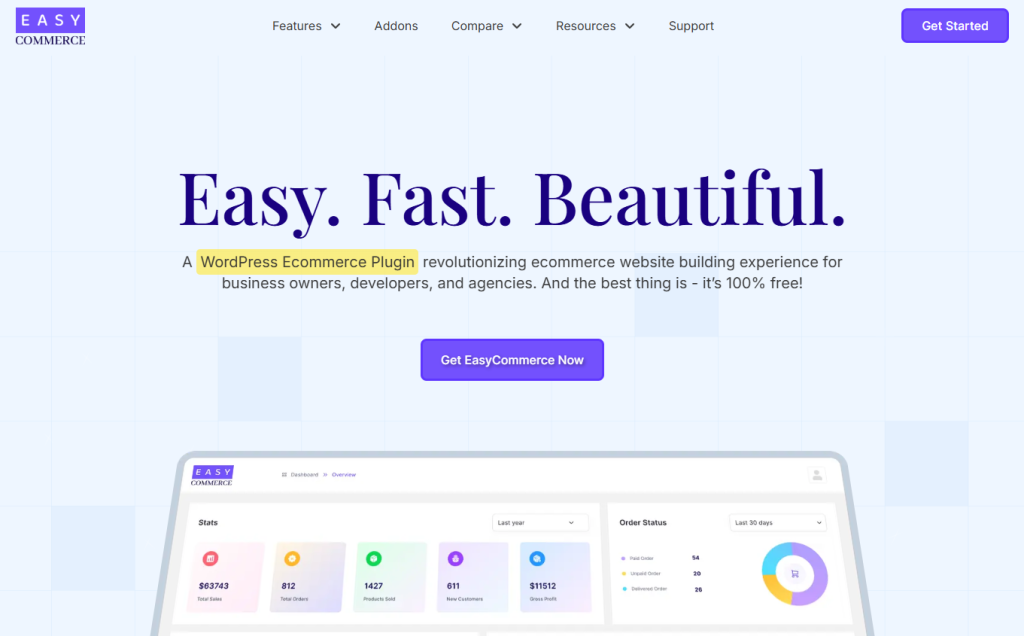
When you want to create a personal ecommerce platform to sell handmade items, EasyCommerce is the go-to platform you can rely on. Designed as a better alternative to WooCommerce, it provides a faster, smoother, and secure ecommerce experience for its users.
Built on WordPress CMS, EasyCommerce lets you transform any website into a fully functional ecommerce store. Unlike other website builders, the core plugin is completely free, with no hidden paid features. While most integrations like payment gateways, automation tools, and CRM are free, some optional ones may require costs.
- ‘Easy’- As its names suggest, EasyCommerce is built to be extremely simple and easy to use. Opposing to the existing platforms available right now, core functionalities of an ecommerce platform such as product listing, customer and order management are made very simple to execute when using EasyCommerce.
- ‘Beautiful’- EasyCommerce was developed to address the limitations of basic interfaces on existing platforms. The default WordPress interface often falls short on not having dynamic pages let alone any graphs showing businesses performance. Whereas, EasyCommerce offers vibrant, static visuals that enhance your ecommerce experience, making it both enjoyable and easy to navigate.
- ‘Fast’- Slow moving website is one of the key reasons ecommerce owners are slowly shifting towards other ecommerce platforms. EasyCommerce has solved this issue as it incorporates a redesigned data processing mechanism – a separate data table for different data types. When joined by its API-first approach, this ensures lighting data processing and website functionality even when your store has grown with thousands of products and their variations.
What We Liked About EasyCommerce
- Built for WordPress CMS, thus compatible with various plugins, addons, and themes.
- Default features such as emails, coupons, shipping, taxation, etc make things convenient.
- Easy to set up and requires no technical understanding whatsoever to maintain.
- Addons like WooCommerce Migration, and CSV Import make the transition streamlined.
What We Didn’t Like About EasyCommerce
- Requires more addons to integrate advanced functionality into your ecommerce store.
Pricing
Free. EasyCommerce is completely free to download, install, and use.
2. Etsy
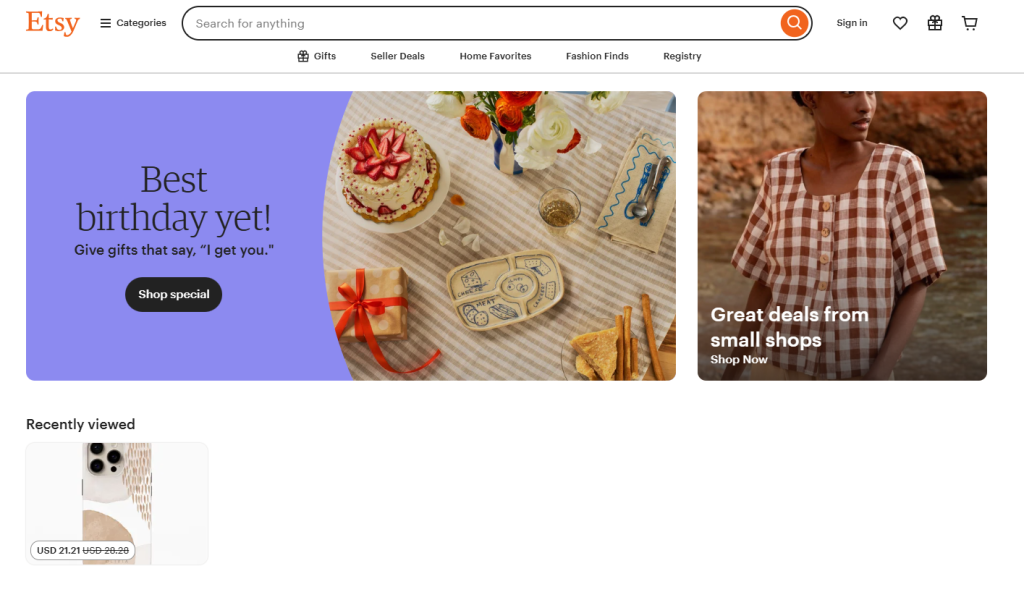
Another standout ecommerce platform for handmade items is Etsy. Since its inception in 2013, Etsy quickly found itself as the top choice for selling and buying handmade, vintage products, and craft supplies.
Unlike EasyCommerce, Etsy is not a personal ecommerce website. Instead, it serves as a platform where you can set up a store, and sell to buyers searching for unique, handmade items.
Etsy’s user-friendly design and vibrant community make it an excellent choice for both the sellers and buyers. Plus, getting started with Etsy is exceptionally easy. Just sign up, create your shop, customize the storefront with your logo, and upload your products along with descriptions and media files.
What We Liked About Etsy
- No development or maintenance is needed. Simply create your store and start selling
- Millions of readymade users increase the chance of your products getting sold.
- Etsy has a strong SEO customization opportunity that helps shoppers find products easily.
- Provides a secure payment system and a trusted platform where buyers feel safe.
What We Didn’t Like About Etsy
- Lacks personal freedom of having an ecommerce website of your own.
Pricing
Each listing costs about $0.20. Off-site ad fees can cost up to 15% when sales cross above $10K per annum.
However, the first 40 listings are completely free for the first four months.
3. Amazon Handmade
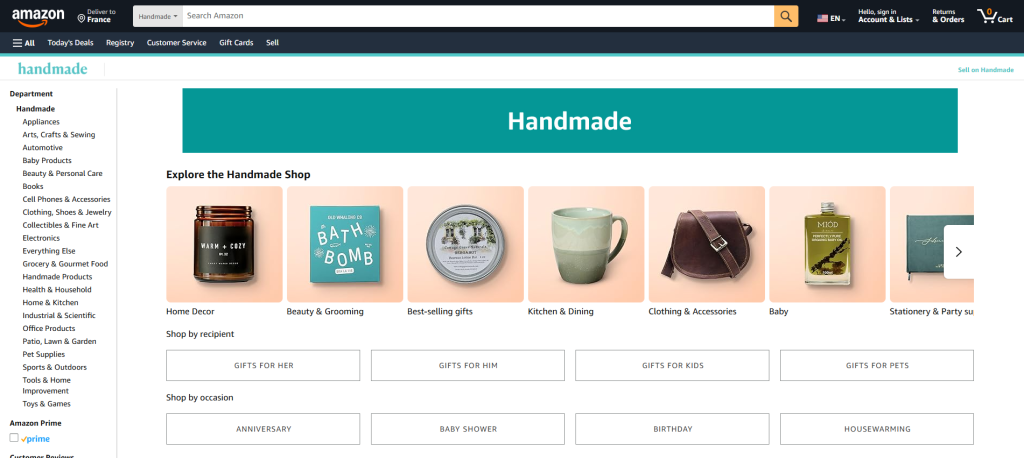
Who doesn’t know about Amazon? It’s undoubtedly been the world’s leading ecommerce platform for decades and it has a dedicated section on Amazon for selling handmade products. It provides access to Amazon’s vast customer base and offers tools like Fulfillment by Amazon (FBA) for shipping.
Like Etsy, Handmade by Amazon requires setting up a storefront with a seller account. However, the key distinction is that Amazon demands specific approval to verify that your products are genuinely handmade.
What We Liked About Amazon Handmade
- The tag Amazon itself works as a branding for your store to earn users’ trust.
- No listing fee to add products to your store.
- Both the seller and buyer rights are protected by Amazon’s security policy.
What We Didn’t Like About Amazon Handmade
- The process requires valid details, which can still be tricky at times.
- Includes a 15% referral fee can be deemed higher sometimes comparing the business size.
Pricing
Free to use with no monthly or payment processing fee. FBA processing fee varies depending on weight and price.
4. Shopify
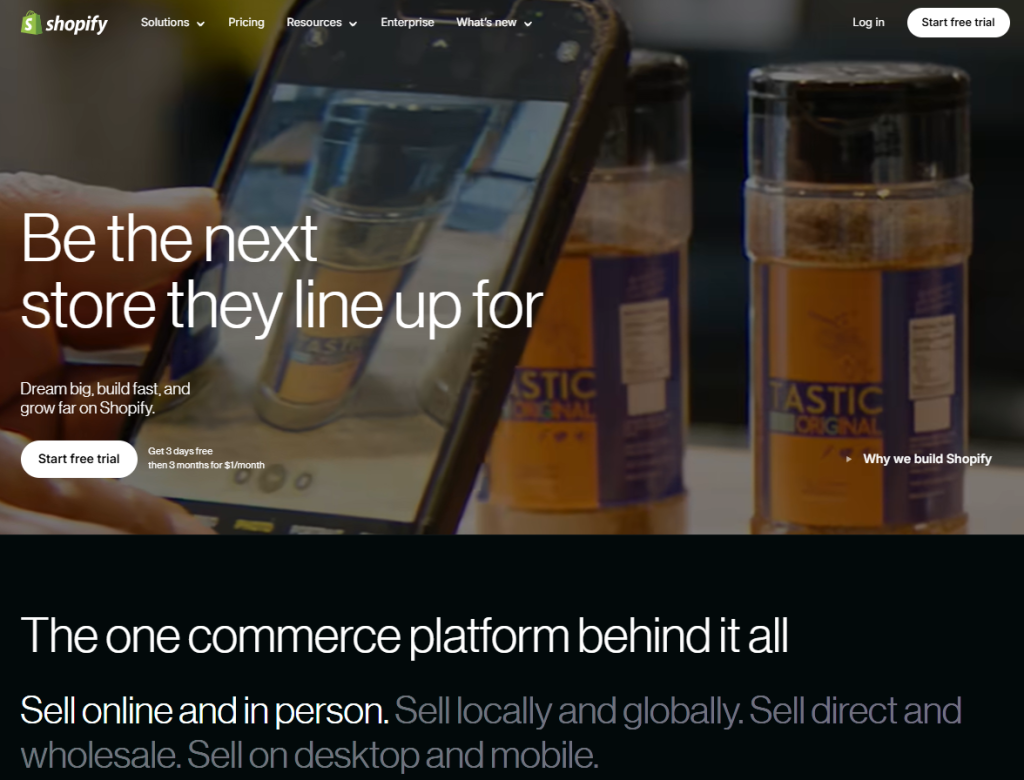
Shopify has been a popular choice among users who are looking to build their own branded store. Unlike WordPress, Shopify operates on cloud-based servers, leaving fewer things for the store owner to handle.
It offers all the other basic features an ecommerce entrepreneur expects for such a platform: product listing, order processing, customer management, checkout, and various integrations.
What We Liked About Shopify
- Shopify offers a robust, stable, and steadfast ecommerce operation.
- Thousands of important extensions and apps to customize your storefront.
- Custom development opportunity (requires Shopify development skills).
What We Didn’t Like About Shopify
- Multitudes of processing fees and other costs involved with running the store.
- Not everyone has the required knowledge to customize a Shopify store.
Pricing
Paid plans start from $39/month for a basic plan. Additional extensions and apps require payment to avail.
Visit their addon store for more detailed information.
5. Big Cartel
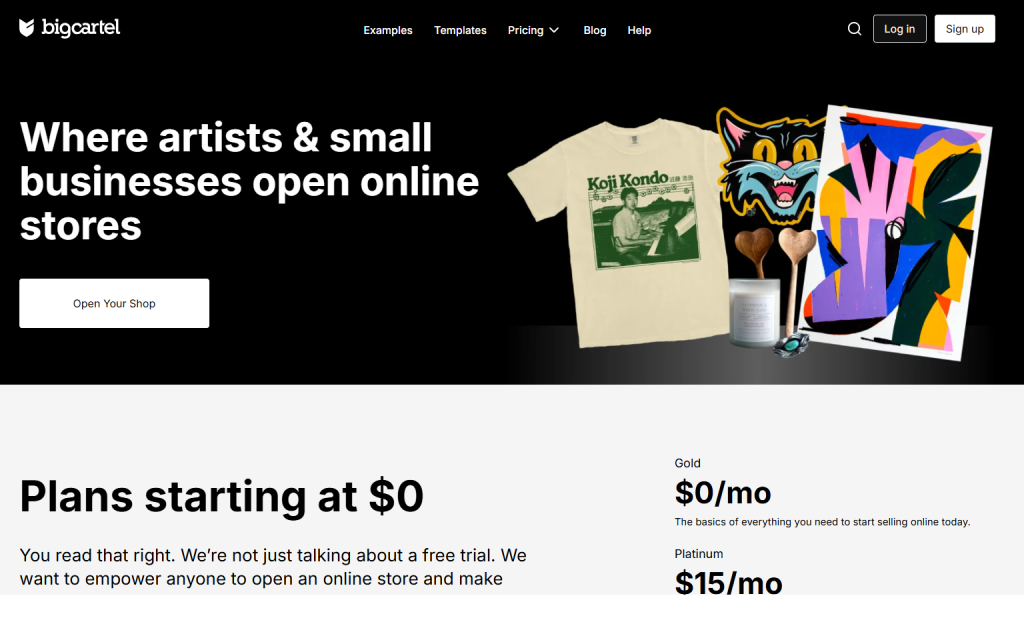
Big Cartel is designed especially for small-scale sellers, artists, and creators who want an affordable way to set up an online store. It offers a simple, intuitive interface that lets you focus on showcasing your creative work without getting confused by complex features.
It provides a no-fuss solution that balances ease of use with essential ecommerce functions. It requires neither a steep learning curve nor a heavy investment to use and operate.
What We Liked About Big Cartel
- For small-scale sellers and independent artists.
- Budget-friendly pricing with minimal extra fees.
- An easy-to-use interface for flexible use by beginners.
What We Didn’t Like About Big Cartel
- May not suit businesses planning a significant expansion of their product offerings
- Doesn’t offer the robust customization options found on larger platforms.
Pricing
This platform has both the free and paid plans including –
- Platinum– $15/month
- Diamond– $30/month
6. Folksy
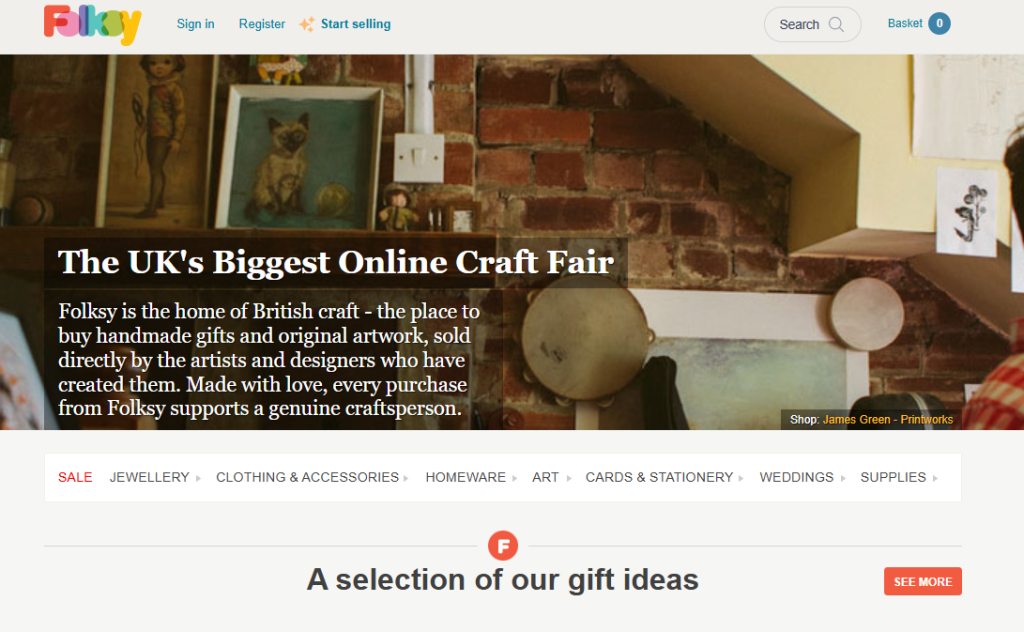
A UK-based ecommerce platform focused on handmade goods. It creates a unique environment where artisans can connect with a community that truly values creativity. This community-centric approach helps handmade businesses succeed quickly with plenty of passionate customers who appreciate unique, handcrafted goods.
If you’re an artistic mind looking for a platform that celebrates the joy of creating handmade happiness, Folksy is the ideal place to showcase your work.
What We Liked About Folksy
- The pricing is widely regarded as highly affordable and accessible to all.
- Unlike Etsy, Folksy requires no payment for offsite advertising.
- Funds are released immediately for the shop owner to maintain a healthy cash capital.
What We Didn’t Like About Folksy
- Operates within the United Kindom region only which puts a barrier for enthusiasts residing outside the UK.
- Not the ideal platform if you intend to sell homemade food items.
Pricing
Requires a product listing fee. Individual product listing costs about 15 pence + VAT whereas you can subscribe to a monthly (£7.5) or yearly(£75) membership plan which allows unlimited product listing and many more.
Conclusion
Handmade items, once scattered through local markets, now have a global stage, thanks to ecommerce platforms. These products are requested by a specific audience for which a central platform is vital for connecting them with their buyers.
If you’re considering creating a platform to sell handmade goods, options like EasyCommerce, Etsy, and Shopify stand out as excellent choices. Each offers unique benefits while serving the same purpose: making it easy for you to set up and run your handmade item store smoothly.
So, let your handmade creativity speak out, and initiate your ecommerce entrepreneurship today!

